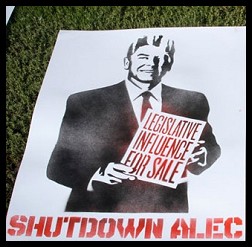Guest Editorial Series by Ernest A. Canning
 This is the second of our three-part series advancing the hypothesis that one must turn to economics to make sense of the so-called 'War on Drugs' and the U.S. government's seemingly irrational obsession with shutting down something as innocuous as medicinal marijuana dispensaries.
This is the second of our three-part series advancing the hypothesis that one must turn to economics to make sense of the so-called 'War on Drugs' and the U.S. government's seemingly irrational obsession with shutting down something as innocuous as medicinal marijuana dispensaries.
PART 1 examined both historical and recent links between the CIA and the illicit drug trade. It explored the extent to which the so-called 'War on Drugs' has been used as cover for the CIA's covert import of narcotics, both into the U.S. and other nations, in order to fund the mischief the Agency engages in on behalf of U.S. Empire. It postulated that the government’s opposition to controlled legalization, taxation and medical, educational and psychological assistance in avoiding substance abuse is the product of an illicit supplier shutting down the competition.
Here, we will examine the profitability of the Prison Industrial Complex in the U.S. and the extent to which the world's largest prison population provides a ready source of slave labor for some of the world's largest corporations…


 'A World of Tyrants,
'A World of Tyrants, 'Green News Report' 5/22/25
'Green News Report' 5/22/25
 'Dangerous Times': Climate Scientist Warns Trump 'Censorship' Endangering Nat'l Security: 'BradCast' 5/21/25
'Dangerous Times': Climate Scientist Warns Trump 'Censorship' Endangering Nat'l Security: 'BradCast' 5/21/25 And Then They Came for Members of Congress...: 'BradCast' 5/20/25
And Then They Came for Members of Congress...: 'BradCast' 5/20/25 'Green News Report' 5/20/25
'Green News Report' 5/20/25 Appeals Court Blocks Last Route for Voters to Challenge Violations of the VRA: 'BradCast' 5/19/25
Appeals Court Blocks Last Route for Voters to Challenge Violations of the VRA: 'BradCast' 5/19/25 Sunday 'Now Hoarding' Toons
Sunday 'Now Hoarding' Toons Mad World:
Mad World: 'Green News Report' 5/15/25
'Green News Report' 5/15/25 Plane Corruption and the Future of the DOJ: 'BradCast' 5/14/25
Plane Corruption and the Future of the DOJ: 'BradCast' 5/14/25 'Deeply Evil': GOP Proposes Largest Medicaid Cuts in History: 'BradCast' 5/13/25
'Deeply Evil': GOP Proposes Largest Medicaid Cuts in History: 'BradCast' 5/13/25 'Green News Report' 5/13/25
'Green News Report' 5/13/25 And Then They Came for the Mayors...: 'BradCast' 5/12/25
And Then They Came for the Mayors...: 'BradCast' 5/12/25 Sunday 'New Guy, Old Guy' Toons
Sunday 'New Guy, Old Guy' Toons Blowing Smoke. At the Vatican and White House: 'BradCast' 5/8/25
Blowing Smoke. At the Vatican and White House: 'BradCast' 5/8/25 'Green News Report' 5/8/25
'Green News Report' 5/8/25 SCOTUS Weighs Public Funding of Religious Schools: 'BradCast' 5/7/25
SCOTUS Weighs Public Funding of Religious Schools: 'BradCast' 5/7/25 Trump Judge Blocks NC GOP Theft of 2024 Supreme Court Seat: 'BradCast' 5/6/25
Trump Judge Blocks NC GOP Theft of 2024 Supreme Court Seat: 'BradCast' 5/6/25 Prosecutors Quit After U.S Attny Strikes Deal With Felon Cop: 'BradCast' 5/5/25
Prosecutors Quit After U.S Attny Strikes Deal With Felon Cop: 'BradCast' 5/5/25 Trump Losing Streak Continues into SECOND Hundred Days: 'BradCast' 5/1/25
Trump Losing Streak Continues into SECOND Hundred Days: 'BradCast' 5/1/25 100 Daze (w/ Digby and Driftglass): 'BradCast' 4/30/25
100 Daze (w/ Digby and Driftglass): 'BradCast' 4/30/25 Campaign to 'Impeach Trump Again' Gains Fresh Momentum: 'BradCast' 4/29/25
Campaign to 'Impeach Trump Again' Gains Fresh Momentum: 'BradCast' 4/29/25 And Then They Came for the Judges...: 'BradCast' 4/28/25
And Then They Came for the Judges...: 'BradCast' 4/28/25 Trump EPA Guts Enviro Justice Office: 'BradCast' 4/24/25
Trump EPA Guts Enviro Justice Office: 'BradCast' 4/24/25
 VA GOP VOTER REG FRAUDSTER OFF HOOK
VA GOP VOTER REG FRAUDSTER OFF HOOK Criminal GOP Voter Registration Fraud Probe Expanding in VA
Criminal GOP Voter Registration Fraud Probe Expanding in VA DOJ PROBE SOUGHT AFTER VA ARREST
DOJ PROBE SOUGHT AFTER VA ARREST Arrest in VA: GOP Voter Reg Scandal Widens
Arrest in VA: GOP Voter Reg Scandal Widens ALL TOGETHER: ROVE, SPROUL, KOCHS, RNC
ALL TOGETHER: ROVE, SPROUL, KOCHS, RNC LATimes: RNC's 'Fired' Sproul Working for Repubs in 'as Many as 30 States'
LATimes: RNC's 'Fired' Sproul Working for Repubs in 'as Many as 30 States' 'Fired' Sproul Group 'Cloned', Still Working for Republicans in At Least 10 States
'Fired' Sproul Group 'Cloned', Still Working for Republicans in At Least 10 States FINALLY: FOX ON GOP REG FRAUD SCANDAL
FINALLY: FOX ON GOP REG FRAUD SCANDAL COLORADO FOLLOWS FLORIDA WITH GOP CRIMINAL INVESTIGATION
COLORADO FOLLOWS FLORIDA WITH GOP CRIMINAL INVESTIGATION CRIMINAL PROBE LAUNCHED INTO GOP VOTER REGISTRATION FRAUD SCANDAL IN FL
CRIMINAL PROBE LAUNCHED INTO GOP VOTER REGISTRATION FRAUD SCANDAL IN FL Brad Breaks PA Photo ID & GOP Registration Fraud Scandal News on Hartmann TV
Brad Breaks PA Photo ID & GOP Registration Fraud Scandal News on Hartmann TV  CAUGHT ON TAPE: COORDINATED NATIONWIDE GOP VOTER REG SCAM
CAUGHT ON TAPE: COORDINATED NATIONWIDE GOP VOTER REG SCAM CRIMINAL ELECTION FRAUD COMPLAINT FILED AGAINST GOP 'FRAUD' FIRM
CRIMINAL ELECTION FRAUD COMPLAINT FILED AGAINST GOP 'FRAUD' FIRM RICK SCOTT GETS ROLLED IN GOP REGISTRATION FRAUD SCANDAL
RICK SCOTT GETS ROLLED IN GOP REGISTRATION FRAUD SCANDAL VIDEO: Brad Breaks GOP Reg Fraud Scandal on Hartmann TV
VIDEO: Brad Breaks GOP Reg Fraud Scandal on Hartmann TV RNC FIRES NATIONAL VOTER REGISTRATION FIRM FOR FRAUD
RNC FIRES NATIONAL VOTER REGISTRATION FIRM FOR FRAUD EXCLUSIVE: Intvw w/ FL Official Who First Discovered GOP Reg Fraud
EXCLUSIVE: Intvw w/ FL Official Who First Discovered GOP Reg Fraud GOP REGISTRATION FRAUD FOUND IN FL
GOP REGISTRATION FRAUD FOUND IN FL






















 How does one explain it?
How does one explain it? On Wednesday, by a bi-partisan vote of 26-3, the Vermont state Senate passed a resolution "calling for an amendment to the [U.S.] Constitution that corporations are not people and money is not speech and can be regulated in political campaigns"
On Wednesday, by a bi-partisan vote of 26-3, the Vermont state Senate passed a resolution "calling for an amendment to the [U.S.] Constitution that corporations are not people and money is not speech and can be regulated in political campaigns"  On
On 
 You've heard the Republican meme of the moment. Mitt Romney, the GOP front-runner and presumptive Presidential nominee recently
You've heard the Republican meme of the moment. Mitt Romney, the GOP front-runner and presumptive Presidential nominee recently 
 We're back tonight guest-hosting the nationally-syndicated
We're back tonight guest-hosting the nationally-syndicated  Waukesha County's oft-failed election administrator, Kathy Nickolaus will not participate in the upcoming recall elections for Gov. Scott Walker, Lt. Gov. Rebecca Kleefisch and four Republican state Senators.
Waukesha County's oft-failed election administrator, Kathy Nickolaus will not participate in the upcoming recall elections for Gov. Scott Walker, Lt. Gov. Rebecca Kleefisch and four Republican state Senators. The War for Wisconsin continues.
The War for Wisconsin continues. A public hand-count of paper ballots in Palm Beach County, FL over the weekend has decisively determined the winners and losers of several disputed elections after paper ballot optical-scan computer tallying systems made by Sequoia Voting Systems (now owned by Dominion Voting) declared the incorrect "winners" of several races in a March 13th election.
A public hand-count of paper ballots in Palm Beach County, FL over the weekend has decisively determined the winners and losers of several disputed elections after paper ballot optical-scan computer tallying systems made by Sequoia Voting Systems (now owned by Dominion Voting) declared the incorrect "winners" of several races in a March 13th election.
 Out of scores of journalists who work for the Gannett Wisconsin Media-owned Green Bay Press-Gazette, just seven were willing to offer their personal, non-business related support for a recall of Wisconsin's controversial Gov. Scott Walker. They are now being disciplined.
Out of scores of journalists who work for the Gannett Wisconsin Media-owned Green Bay Press-Gazette, just seven were willing to offer their personal, non-business related support for a recall of Wisconsin's controversial Gov. Scott Walker. They are now being disciplined. In Wisconsin, two Dane County Circuit Court judges, David Flanagan and Richard Niess both issued injunctions against the state GOP's polling place photo ID restriction ("Act 23") --- Flanagan's
In Wisconsin, two Dane County Circuit Court judges, David Flanagan and Richard Niess both issued injunctions against the state GOP's polling place photo ID restriction ("Act 23") --- Flanagan's 












